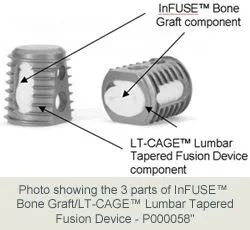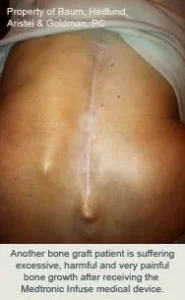A California state court judge ruled in favor of a California resident represented by Wisner Baum, allowing her lawsuit against Medtronic to move forward. This is good news for patients across the country who received the Medtronic INFUSE® Bone Graft medical device procedure in an off-label manner, not approved by the FDA.
Lawyers Investigate Hospitals Where Spine Surgeries Caused Patients Severe Pain, Excessive Bone Growth and Other Complications
Wisner Baum’s first Infuse case involves back surgery patient, April Cabana, who originally sued Medtronic, in addition to Stryker Biotech, her doctor, and Pomona Valley Hospital Medical Center, on July 13, 2011 after two different medical devices implanted during two different back surgeries resulted in debilitating and permanent injuries to her spine.
Wisner Baum has Defeated Preemption In Ms. Cabana’s Case Three Times
- August 20, 2012 re Medtronic Infuse
- September 9, 2013 re Medtronic Infuse
- September 9, 2013 re Stryker OP-1 Putty
What is Medtronic INFUSE Bone Graft?

The FDA approved Infuse Bone Graft Device in 2002 for a limited type of spinal fusion surgery to alleviate severe back pain. Infuse Bone Graft Device is a liquid substance produced by a genetically engineered Chinese hamster ovary cell line. It is a recombinant bone morphogenetic protein (“BMP”) that is supposed to stimulate controlled bone growth and fuse the vertebrae.
October 31, 2012
The U.S. Senate Finance Committee issued a lengthy report showing that medical device maker Medtronic, Inc. paid doctors hundreds of millions of dollars to manipulate studies and write favorable articles on the company’s popular bone graft product, InFUSE. Read More
Trouble for Medtronic INFUSE

Medtronic has been under scrutiny for years now concerning allegations of illegal off-label promotion and use of Infuse Bone Graft Device, financial conflicts of interest by researchers, under-reporting of complications and overblown reports of superior clinical results. About 85% of Infuse use is off-label according to MedPage Today.
- In July of 2011, the prominent medical journal, The Spine Journal, dedicated its entire journal to publishing numerous articles regarding the risks associated with the Infuse Bone Graft Device.
- Medtronic paid $85 million in March of 2012 to settle a shareholder lawsuit accusing it of making misleading statements concerning Infuse Bone Graft Device. According to a Reuters report, the settlement resolves claims that Medtronic failed to reveal that as much as 85.2 percent of Infuse sales depended on so-called “off-label” uses, where doctors sometimes paid by Medtronic would prescribe the product for applications not approved by the FDA.
- Although the U.S. Department of Justice closed its investigation into Medtronic’s marketing and alleged off-label use of Infuse Bone Graft in May of 2012, Senators Charles Grassley (R-Iowa) and Max Baucus (D-Mont.) have investigations pending looking into allegations that Medtronic failed to report Infuse Bone Graft side effects and that the company may have had financial ties to clinical investigators.
- Last summer Medtronic commissioned researchers at Yale University with a $2.5M grant to conduct an independent review of the safety and effectiveness of Infuse Bone Graft, including all patient data generated during the Infuse clinical trials. Although Yale stated it would make the results of its review public by summer of 2012, it has yet to do so.
Contact us by filling out the online form.




